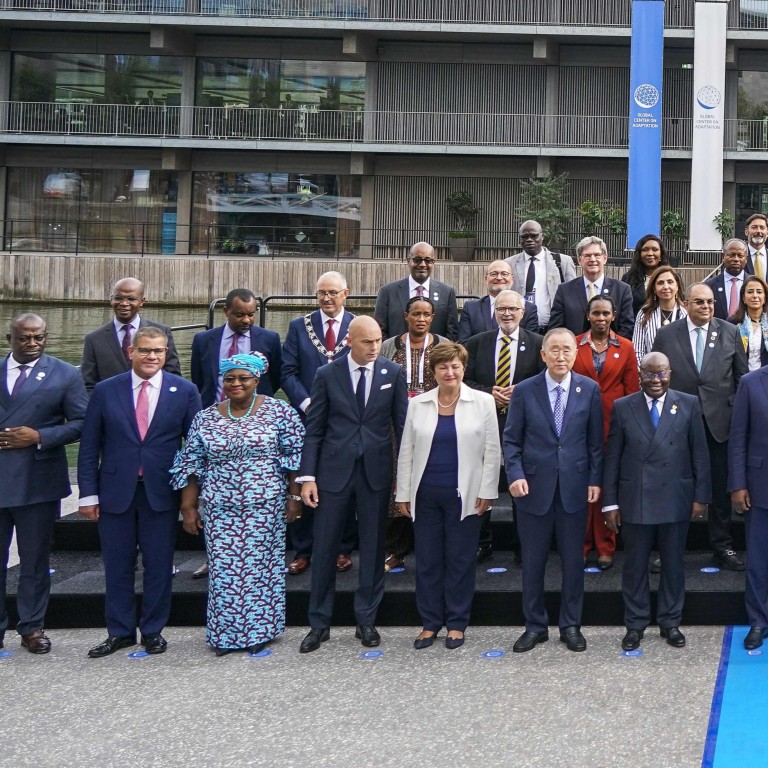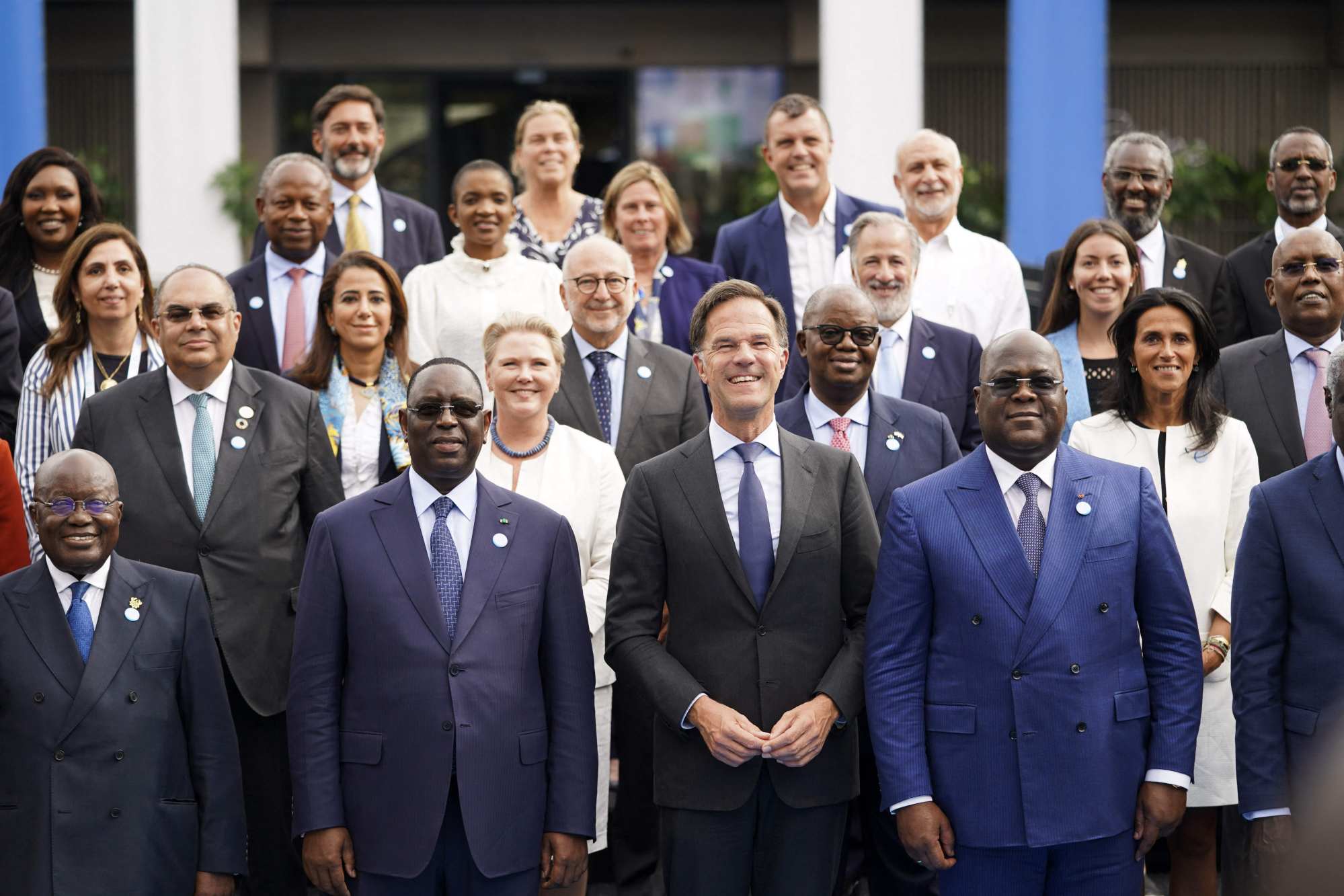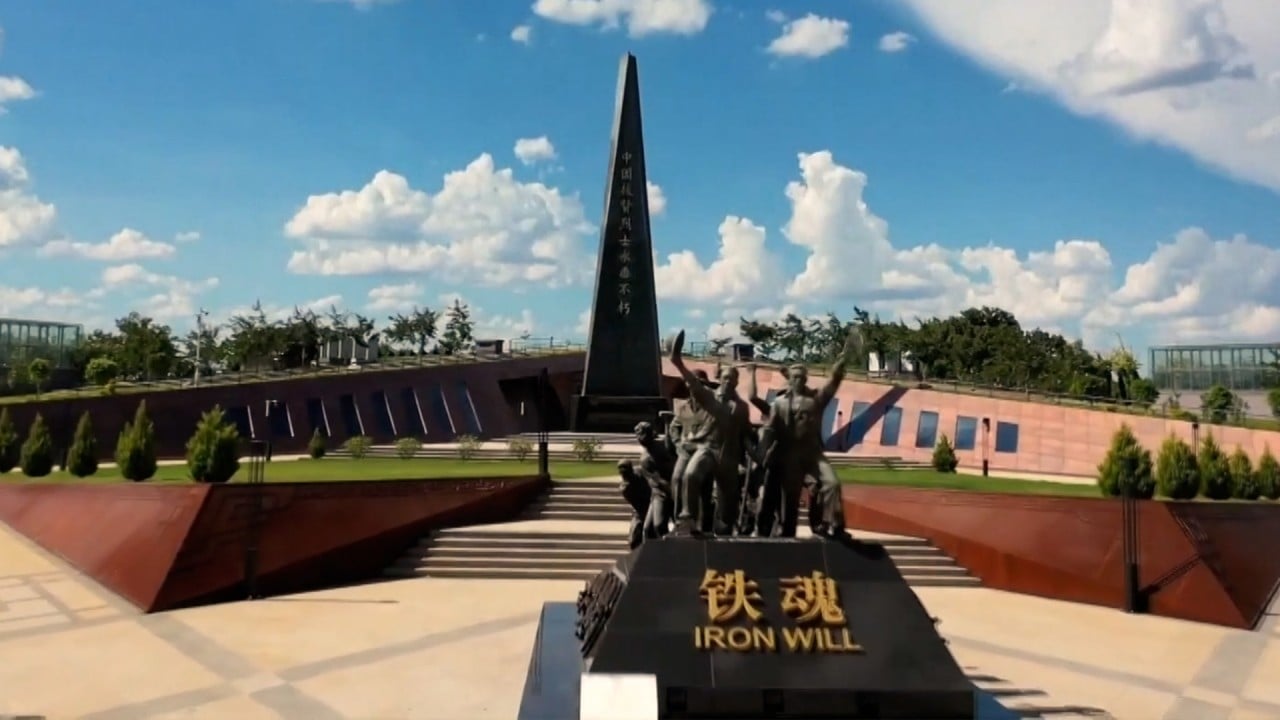
Europe’s ‘patronising’ efforts to counter Russia and China in Africa falling flat
- EU leaders’ ‘lack of effort’ at winning over their African counterparts have left a ‘bitter taste’, according to Senegal’s President Macky Sall
- Europe has pledged hundreds of billions of dollars under the Global Gateway Initiative, designed to counter China’s Belt and Road Initiative
This was evident at the African Adaptation Summit in Rotterdam last week when European leaders failed to turn up for a meeting to fundraise for Africa’s climate adaptation projects.
Dutch Prime Minister Mark Rutte, the only European leader to attend in person, said: “I would have loved to have more of my European colleagues here.”
Six African heads of state were present, including the current African Union chairman and Senegal’s President Macky Sall, as well as leaders from Ghana, Gabon, the Democratic Republic of Congo and Ethiopia.
Sall said: “I cannot help but note, with some bitterness, the absence of leaders from the industrial world. I think if we made the effort to leave Africa to come to Rotterdam, it would be easier for the Europeans and others to be here.
“This leaves a bad taste in our mouths. I am a bit disappointed, to be honest.”
In another incident, at the EU-Africa Summit in Brussels in February, around 40 African leaders were invited by the European Union, but at one point only the Belgian Prime Minister Alexander de Croo was reportedly present from the other side.
“It was a very bad form on the part of the Europeans. They could have coordinated to have substantive representation throughout the event,” W. Gyude Moore, a former minister of public works in Liberia, said. “Could you imagine where Africans hosted 40 European leaders at an event in Accra and then left them in the room with the president of Ghana?”
As part of the EU-Africa Summit, some deals were signed in Senegal, but progress has been overshadowed by the events in Ukraine and Covid-19. “There is a long history of unfulfilled commitments, so this might just be par for the course,” Moore said.
Observers say the EU is nervous about the fact that it is losing influence in Africa with the growing presence of China, Russia, Türkiye and other global players. But the EU is internally divided and not able to live up to its ambitions to become a stronger global player, according to Geert Laporte, the director of European Think Tanks Group.

He said several African leaders and their populations had lost trust in Europe with “Europe patronising, overpromising and underdelivering”.
“To turn the tide, the EU is copying China and other global players with big funding promises (Global Gateway) mainly in visible infrastructure type of initiatives. But with the war at home it is not obvious that the EU will be able to keep its promises,” Laporte noted.
The continent has recently witnessed a procession of high-profile visitors from France, the United States and Russia, but observers said America and Europe were known to make promises that they did not deliver.
Adams Bodomo, an African studies expert at the University of Vienna, said that “the US and the EU have never hidden the fact that they want to counter China.”
Bodomo argued that the US and EU were talking more than acting, despite the fact that each of their grand plans for Africa had always been drawn up as an alternative to the Belt and Road Initiative. He continued, “China plans and builds, but America plans and bombs.”
According to Bodomo, Russia’s engagement with Africa was intended to demonstrate that it offered a competitive alternative to the Western powers there and took advantage of its positive relations with the region to influence votes in the United Nations.
In August, when US Secretary of State Antony Blinken visited South Africa, Naledi Pandor, South Africa’s minister for international relations and cooperation, said it was “patronising” for some European countries to force countries to condemn Russia.
“And one thing I definitely dislike is being told ‘either you choose this or else’. When a minister speaks to me like that … I definitely will not be bullied in that way, nor would I expect any other African country worth its salt to agree to be treated [that way],” Pandor said.
South Africa is among dozens of African countries that abstained from voting on the UN resolution condemning the Russian invasion of Ukraine.
Last month, Chinese Foreign Minister Wang Yi told a group of African leaders in a virtual event that “China is making steady progress in implementing all the pledges it made in Dakar [at the Forum on China–Africa Cooperation last year], despite various difficulties and disturbances”.
He said over US$3 billion had been delivered out of the US$10 billion of credit facilities pledged to African financial institutions, and nearly US$2.5 billion of loans were channelled to Africa’s priority programmes. More than US$2 billion of the US$10 billion of trade finance had been allocated, Wang said.
France, which has in the past contributed thousands of troops to bring stability to fragile West African nations, is now being challenged by Russia. France’s last troops left Mali in August, ending a nine-year anti-terror operation after Bamako accused it of supporting terrorist groups. And they are being replaced by Russian mercenaries from the Kremlin-linked Wagner mercenary group.
Moore said “the growth of both Chinese and Russian influence in Africa has heightened the pace at which their rivals and adversaries have visited the continent”.
Alex Vines, head of the Africa programme at London-based think tank Chatham House, said 25 per cent of the United Nations General Assembly was African – “the numbers game matters for many – increasingly in a world of multipolarity and increasing geopolitics”.
Vines said the Russian invasion of Ukraine happened a week after the EU-Africa summit and EU attention was focused elsewhere, but added: “Increased EU funding through the Gateway Europe initiative is still planned.”
For Russia and China, “the simply large number of countries in sub-Saharan Africa makes it a less expensive place to ‘buy’ votes in international organisations”, according to Douglas Yates, a political scientist specialising in African politics at the American Graduate School in Paris.
“Not only are these countries interested in the ideological struggles of international votes and sanctions and the like, but they make excellent grounds for espionage – because African countries often have information, and they are quite porous,” he said.


